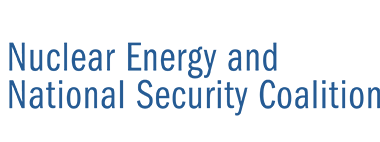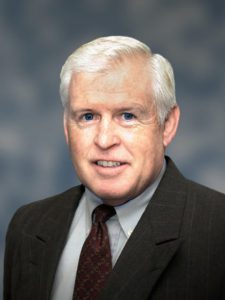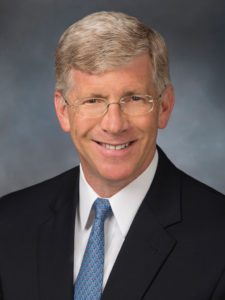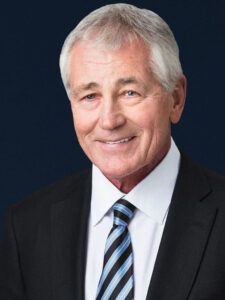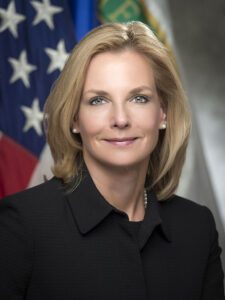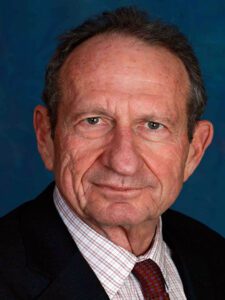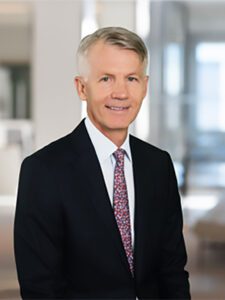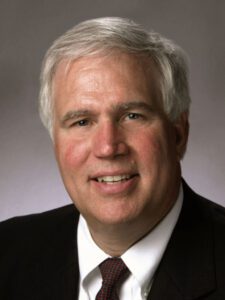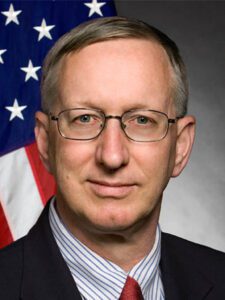Admiral Richard W. Mies (ret.)
Admiral Mies completed a distinguished 35-year career in the US Navy. He commanded US Strategic Command for four years prior to retirement. As Commander in Chief, he was directly responsible for the command and control of the Nation’s strategic nuclear forces supporting the national security objective of strategic deterrence.
Admiral Mies has a unique breadth and depth of operational and policy experience in undersea and strategic warfare. He has held both US and Allied commands at senior military levels. After completing training for submarine duty, he served on two nuclear attack submarines and a ballistic missile submarine before commanding the nuclear attack submarine, USS SEA DEVIL. He subsequently served in a wide range of distinctive command positions including Commander Submarine Development Squadron TWELVE, Commander, Submarine Group EIGHT and Commander, Allied Submarines, Mediterranean, and Commander, Submarine Force, U.S. Atlantic Fleet and Commander, Submarine Allied Command, Atlantic.
Admiral Mies is one of a few flag officers to complete qualification as both a submariner and naval aviation observer. In addition to unit and service awards, his decorations include the Defense Distinguished Service Medal, Navy Distinguished Service Medal, Defense Superior Service Medal (two awards), Legion of Merit (four awards), National Intelligence Distinguished Service Medal, Meritorious Service Medal (two awards), Navy Commendation Medal (four awards), Navy Achievement Medal, and Secretary of Energy Gold Medal.
Admiral Mies is a native of Chicago, Illinois. A distinguished scholar and athlete, he graduated first in his class with highest honors from the U. S. Naval Academy. He holds a Bachelor of Science degree with majors in mechanical engineering and mathematics. An intercollegiate wrestling champion and an all-conference lightweight football player, he was awarded the Thompson Trophy for contributing the most to the promotion of athletics at the Naval Academy. He has completed post-graduate education at Oxford University, England, the Fletcher School of Law and Diplomacy, and Harvard University. He holds a Masters degree in government administration and international relations; he also holds an Honorary Doctorate of Law degree from the University of Nebraska and was honored as a Distinguished Graduate of the Naval Academy. His professional education includes the Flag Officers’ Capstone course, the program for Senior Executives in National and International Security at Harvard University, and the Joint Flag Officer Warfighting course.
Following retirement from the Navy, Admiral Mies served as a Senior Vice President and Deputy Group President of Science Applications International Corporation (SAIC) and as the President and Chief Executive Officer of Hicks and Associates, Inc, a wholly owned subsidiary of SAIC. He presently serves as the CEO and President of The Mies Group, LTD. Admiral Mies served as the Chairman of the Department of Defense Threat Reduction Advisory Committee from 2004-2010 and Chairman of the Boards of the Navy Mutual Aid Association from 2003-2011 and the Naval Submarine League from 2007-2016. He also served as a member and then Vice Chair of the Secretary of Energy Advisory Board from 2015-2020 and as a member of the Board of Governors of Los Alamos National Laboratory from 2004-2018. He previously served on the board of directors of Mutual of Omaha, McDermott International, Babcock and Wilcox, BWX Technologies, Exelon Corporation, the US Naval Academy Foundation, and the US Naval Institute. He presently serves as the Chairman of the Strategic Advisory Group for US Strategic Command, Co-chair of the Nuclear Energy and National Security Coalition, Chairman of the Pennsylvania State University Applied Research Laboratory Advisory Board, Chairman of the Oak Ridge National Laboratory National Security Sciences Directorate Advisory Board, and is a member of the Committee on International Security and Arms Control of the National Academy of Sciences and the Board of Governors of Lawrence Livermore National Laboratory.
Daniel B. Poneman
Daniel B. Poneman is a distinguished fellow of the Atlantic Council’s Global Energy Center. He is also a distinguished fellow of the Council’s Scowcroft Center for Strategy and Security and a member of its advisory council. Poneman is the former president and chief executive officer of Centrus Energy Corp., which he led from 2015 to 2023.
Prior to joining Centrus Energy Corp., Poneman served as US deputy secretary of energy and as chief operating officer of the department from 2009 to 2014. Between April 2013 and May 2013, Poneman was the acting secretary of energy.
Before assuming his responsibilities as deputy secretary, Poneman served as a principal of The Scowcroft Group for eight years, and from 1993 through 1996, he served as special assistant to the president and senior director for nonproliferation and export controls at the National Security Council. His responsibilities included the development and implementation of US policy in such areas as peaceful nuclear cooperation, missile technology, space-launch activities, sanctions determinations, chemical and biological arms control efforts, and conventional arms transfer policy.
Poneman first joined the Department of Energy in 1989 as a White House fellow. In 1990, he joined the National Security Council staff as director of defense policy and arms control.
Between tours of government service, Poneman practiced law for nine years in Washington, DC, as an associate at Covington & Burling and as a partner at Hogan & Hartson.
Poneman has published widely on national security issues. He is the author of Nuclear Power in the Developing World, Argentina: Democracy on Trial, and Double Jeopardy: Combating Nuclear Terror and Climate Change. His third book, Going Critical: The First North Korean Nuclear Crisis (coauthored with Joel Wit and Robert Gallucci), received the 2005 Douglas Dillon Award for Distinguished Writing on American Diplomacy.
After leaving government, Poneman was a senior fellow at the Belfer Center for Science and International Affairs at the Harvard Kennedy School. He is a distinguished fellow at the Paulson Institute and a member of the Council on Foreign Relations.
Poneman received AB and JD degrees with honors from Harvard University and an MLitt in politics from Oxford University.
Chuck Hagel
Chuck Hagel was the 24th Secretary of Defense, serving from February 2013 to February 2015. He is the only Vietnam veteran and the first enlisted combat veteran to serve as Secretary of Defense.
Hagel served two terms in the United States Senate (1997–2009) representing the state of Nebraska. Hagel was a senior member of the Senate Foreign Relations; Banking, Housing and Urban Affairs; and Intelligence Committees. He Chaired the Foreign Relations International Economic Policy, Export and Trade Promotion Subcommittee; and the Banking Committee’s International Trade and Finance, and Securities Subcommittees. Hagel also served as the Chairman of the Congressional–Executive Commission on China and the Senate Climate Change Observer Group.
Previously, Secretary Hagel was Co-Chairman of the President’s Intelligence Advisory Board, Chairman of the Atlantic Council, and a Distinguished Professor at Georgetown University. He served as a member of the Secretary of Defense’s Policy Board and Secretary of Energy’s Blue Ribbon Commission on the Future of Nuclear Power, Systemic Risk Council Board of Directors. Hagel also served as Chief Operating Officer of the 1990 Economic Summit of Industrialized Nations (G–7 Summit) and Deputy Administrator of the Veterans Administration under President Ronald Reagan and Deputy Commissioner General of the 1982 World’s Fair.
Prior to his election to the U.S. Senate, Hagel was president of McCarthy & Company, an investment banking firm in Omaha, Nebraska. In the mid–1980’s, Hagel co–founded VANGUARD Cellular Systems, Inc., a publicly traded corporation. He was President and CEO of the World USO and Private Sector Council (PSC).
Some of Hagel’s current commitments include service on the United States Military Academy Board of Visitors; Board of Trustees of RAND; Advisory Board of Corsair Capital; Senior Advisor to the McCarthy Group; Centennial Scholar, Georgetown Walsh School of Foreign Service; Distinguished Scholar, University of Nebraska at Omaha; Distinguished Statesman at the Atlantic Council; Board of Directors of Public Broadcasting Service (PBS); Board of Trustees of the United States Capitol Historical Society; Director and Co–Founding Member of the American Security Project; Advisory Board Chairman of the HillVets Veterans Organization; and Chairman of the Veterans Justice Commission.
He is the author of the book, America: Our Next Chapter. He and his brother Tom are the subjects of a 2018 book by General Daniel Bolger entitled, Our Year of War. Hagel is also the subject of a 2006 book by Charlyne Berens entitled, Chuck Hagel: Moving Forward. He is a graduate of the University of Nebraska at Omaha. Hagel and his wife, Lilibet, have a daughter (Allyn) and son (Ziller).
John Deutch
John Deutch is an Institute Professor Emeritus at the Massachusetts Institute of Technology. Mr. Deutch has been a member of the MIT faculty since 1970, and has served as Chairman of the Department of Chemistry, Dean of Science, and Provost. Mr. Deutch has published over 160 technical publications in physical chemistry, as well as numerous publications on technology, energy, international security, and public policy issues.
John Deutch served as Director of Central Intelligence from May 1995–December 1996. From 1994–1995, he served as Deputy Secretary of Defense and served as Undersecretary of Defense for Acquisition and Technology from 1993–1994. John Deutch has also served as Director of Energy Research (1977–1979), Acting Assistant Secretary for Energy Technology (1979), and Undersecretary (1979–80) in the United States Department of Energy. In addition, John Deutch has served on the President’s Nuclear Safety Oversight Committee (1980–81); the President’s Commission on Strategic Forces (1983); the White House Science Council (1985–89); the President’s Foreign Intelligence Advisory Board (1990–93); the President’s Commission on Aviation Safety and Security (1996); the President’s Commission on Reducing and Protecting Government Secrecy (1996–1997); and as Chairman of the Commission to Assess the Organization of the Federal Government to Combat the Proliferation of Weapons of Mass Destruction (1998–99). He was a member of the President’s Committee of Advisors on Science and Technology (1997–2001) and a member of the National Petroleum Council (2008–2018). He received the Aspen Strategy Group Leadership Award in 2004 and was the Phi Beta Kappa “Orator” at Harvard University, 2005. He is a member of the National Petroleum Council and the American Philosophical Society. In 2009 John Deutch received the MIT Gordon Y Billard award: “… for special service of outstanding merit performed for the Institute.” He was a member of the Secretary of Energy Advisory Board (2012 – 2017) and chair (2014–2017).
He has served on the board of directors of Cheniere, Citigroup, CMS, Cummins, Raytheon, Schlumberger, and SAIC and as a Trustee or Director of the Museum of Fine Arts, Boston; Massachusetts General Hospital Physicians Organization, Center for American Progress, theCouncil on Foreign Relations, Resources for the Future, and the Urban Institute.
Susan Eisenhower
Ms. Eisenhower is well-known for her work as a policy analyst, much of which has been focused on national security, and related strategic issues. She has brought this work to light in her writing as an essayist, op-ed writer, biographer, and editor. She has authored hundreds of op-eds for newspapers such as The Washington Post, The New York Times, and the Los Angeles Times. Her articles have also appeared in the National Academy of Sciences’ Issues in Science and Technology and the Naval Institute’s Proceedings. Early in her career, she wrote humor for The Saturday Evening Post.
Her most recent book has received critical acclaim nationally and internationally: How Ike Led: The Principles Behind Eisenhower’s Biggest Decisions (Thomas Dunne Books, an imprint of St Martin’s Publishing Group: August 11, 2020).
Eisenhower has provided analysis for CNN International, MSNBC, The Situation Room with Wolf Blitzer, FOX News, CBS Sunday Morning in an interview with Rita Braver, the BBC, and all three major network morning programs. On the lighter side, she has appeared on the Colbert Report and Real Time with Bill Maher, in addition to many other well-remembered programs such as the PBS Newshour with Jim Lehrer, Hardball with Chris Mathews, Nightline with Ted Koppel, World News Tonight with Peter Jennings, This Week with David Brinkley, and CBS Sunday Morning with Charles Kuralt.
Beyond the well-known range of current affairs and news programs, Eisenhower has been seen as a “talking head” on documentaries, such as Oliver North’s War Stories, Sony Pictures Why We Fight and David Hoffman’s Sputnik Mania. Most recently she has been interviewed for several documentaries on D-Day.
In 1986, Susan Eisenhower founded The Eisenhower Group, Inc., a Washington, DC, based consulting company. For more than thirty years, the company has provided strategic counsel on business development, public affairs, and communications projects. Through the Eisenhower Group, Inc., Ms. Eisenhower does extensive work in executive training on strategic leadership, a lecture topic she presents to many corporate and organizational venues.
In addition to her work through EGI, Susan Eisenhower has also had a distinguished career as a policy analyst. She is Chairman Emeritus at the Eisenhower Institute where she served as president twice. Currently she holds a year-long seminar on strategy for competitively selected students through the Eisenhower Institute at Gettysburg College. She has also been a Fellow at Harvard University’s Institute of Politics as well as a Distinguished Fellow at the Nixon Center, now called the Center for National Interest.
During different administrations, she served as a member of three blue ribbon commissions for the Department of Energy: The Baker-Cutler Commission on U.S. Funded Non-Proliferation Programs in Russia; The Sununu-Meserve Commission on Nuclear Energy; and the Blue Ribbon Commission on America’s Nuclear Future, which released its findings on a comprehensive program for the back end of the nuclear fuel cycle. She is currently a member of MIT’s Energy Initiative Advisory Board and former co-chairman of NEAC, the Secretary of Energy’s Nuclear Energy Advisory Board.
In 1998 Susan Eisenhower was appointed to the National Academy of Sciences Standing Committee on International Security and Arms Control, where she served for eight years. After as many years on the NASA Advisory Council, she became a member of the International Space Station Management and Cost Evaluation Task Force.
Today, Ms. Eisenhower serves on a number of charitable and corporate advisory boards.
Lisa E. Gordon-Hagerty
Lisa E. Gordon-Hagerty served as the Administrator of the National Nuclear Security Administration (NNSA) and Under Secretary for Nuclear Security at the U.S. Department of Energy (DOE) from February 2018 until November 2020. Confirmed by the United States Senate on February 15, 2018, she was the first woman to hold this leadership position. With more than 30 years of national security experience, Ms. Gordon-Hagerty was responsible for the management and operations of NNSA in support of President Trump’s nuclear security agenda. NNSA is a semi-autonomous agency within DOE responsible for enhancing national security through the military application of nuclear science. NNSA maintains and enhances the safety, security, and effectiveness of the U.S. nuclear weapons stockpile; works to reduce the global danger from weapons of mass destruction; provides the U.S. Navy with safe and effective nuclear propulsion; and responds to nuclear and radiological emergencies in the U.S. and abroad. She was a member of the joint DOD-DOE Nuclear Weapons Council.
Ms. Gordon-Hagerty served as a career civil servant in several U.S. Government leadership positions, including as the Director of Combating Terrorism, National Security Council staff for more than five years. She also served at DOE as the Director, Office of Emergency Response, and as Acting Director, Office of Nuclear Weapons Surety. Ms. Gordon-Hagerty was a professional staff member on the U.S. House of Representatives Committee on Energy and Commerce. She began her professional career as a health physicist at NNSA’s Lawrence Livermore National Laboratory.
Presently, Ms. Gordon-Hagerty is the CEO of Wolverine Global, Inc, (formerly LEG, Inc.) a Woman Owned Small Business in Delray Beach, FL. She serves as an Outside Director with Visible Assets, Inc., and Westinghouse Electric Corporation, WGS. She recently served as a commissioner of the Strategic Posture Commission established by the FY22 National Defense Authorization Act which was released in October 2023. Prior to joining the Trump Administration, Ms. Gordon-Hagerty was president of Tier Tech International, Inc., a Service-Disabled Veteran Owned Small Business providing professional expertise to combating WMD terrorism worldwide. She was president and CEO of LEG, Inc., a consulting firm focusing on national security issues. Ms. Gordon-Hagerty served as the Executive Vice President and Chief Operating Officer of USEC, Inc. at the time, the world’s largest commercial uranium enrichment company.
Ms. Gordon-Hagerty holds a Master of Public Health degree in Health Physics and a Bachelor of Science, both from the University of Michigan. She is a member of the Council on Foreign Relations and the Health Physics Society.
Richard A. Meserve
Richard A. Meserve is Senior Of Counsel in the Washington, DC, office of Covington & Burling LLP. He is the President Emeritus of the Carnegie Institution for Science and former Chairman of the U.S. Nuclear Regulatory Commission. He is a member of the National Academy of Engineering, the American Academy of Arts and Sciences, and the American Philosophical Society, a Fellow of the American Physical Society and the American Association for the Advancement of Science, and a foreign member of the Russian Academy of Sciences. Early in his career, after obtaining a PhD in applied physics from Stanford and a JD from Harvard Law School, he served as law clerk to Supreme Court Justice Harry A. Blackmun and as legal counsel to the President’s Science Adviser. Among other activities, he is the former President of the Board of Overseers of Harvard University and the former Chairman of the International Nuclear Safety Group (chartered by the International Atomic Energy Agency). He has chaired or served as a member of a wide variety of studies undertaken by the National Academies of Sciences, Engineering, and Medicine, including as chairman of a recently completed study of advanced reactors. He is currently serving as an external adviser to the Japanese Nuclear Regulation Authority, the regulator established after the Fukushima accident, and has received the Order of the Rising Sun, Gold and Silver Stars, from the Japanese Emperor for his service to Japan after the accident.
Sherri Goodman
Sherri Goodman is Senior Fellow at the Woodrow Wilson International Center’s Polar Institute and Environmental Change & Security Program and Secretary General of the International Military Council on Climate & Security (IMCCS), representing over 40 military and national security organizations addressing the security risks of a changing climate.
Sherri serves as Vice-Chair of the US Secretary of State’s International Security Advisory Board (ISAB). She co-chairs, with Dan Poneman, the High Level Commission on Nuclear Energy and Climate Security.
Sherri is the author of Threat Multiplier: Climate, Military Leadership and the Fight for Global Security (Island Press 2024).
Sherri chairs the Board of the Council on Strategic Risks and chairs the External Advisory Board on Energy and Homeland Security for Sandia National Laboratories. She serves on the Climate Council of the US EXIM Bank. Sherri is a Board Director of the Atlantic Council and a Life Member of the Council on Foreign Relations.
Sherri is the former President and CEO of the Consortium for Ocean Leadership. She served as Senior Vice President and General Counsel of CNA (US Center for Naval Analyses). She is the founder and Executive Director of the CNA Military Advisory Board, whose landmark reports include National Security and the Threat of Climate Change(2007) and Advanced Energy and US National Security (2017).
Sherri served as the first Deputy Undersecretary of Defense (Environmental Security), (1993-2001), where she was responsible for environmental, energy, safety and occupational health for the US Department of Defense. She established the first environmental, safety and health performance metrics for the Department, and led its energy efficiency, environmental and natural resource conservation programs. Overseeing the President’s plan for revitalizing base closure communities, she ensured that 80% of base closure property became available for transfer and reuse. She led the Secretary’s Arctic Military Environmental Cooperation program which developed a container for storage of spent nuclear fuel for liquid waste from Russian nuclear submarines.
Sherri received EPA’s Climate Change Award and twice received the DOD medal for Distinguished Public Service. She received an Honorary Doctorate from Amherst College in 2018 and the Environmental Peacebuilding Associations’ Lifetime Achievement Award in 2024.
A graduate of Amherst College, she has degrees from Harvard Law School and Harvard Kennedy School.
Jeffery “Skunk” Baxter
Jeffrey “Skunk” Baxter is currently a consultant/contractor for a number of US Government agencies and advises military, government, defense contractors and civilian groups on missile defense, terrorism, counter-terrorism, cyber-warfare, intelligence, ISR & Space, virtual reality, war gaming, next-generation technology and unconventional strategies. He is a Senior Fellow and member of the Board of Regents at the Potomac Institute for Policy Studies, a member of the Director’s Strategic Red Team at MIT/ Lincoln Laboratories, a consultant for the Global Security & Intelligence Sector of the Lawrence Livermore National Laboratory and a Senior Thinker for the Institute For Human & Machine Cognition. He was a Specialist Reserve Officer with the Anti-Terrorist Division of the Los Angeles Police Dept for 15 years and a founding member of the Terrorism Early Warning Group, Los Angeles Sheriff’s Department and a consultant for General Atomics.
Mr. Stephen Rademaker
Stephen Rademaker is Senior of Counsel at the Washington, D.C. law firm of Covington & Burling, and an Adjunct Professor at Georgetown University, where he teaches at the graduate level on U.S. sanctions policy. He joined Covington & Burling following a long career in public service in all three branches of government. Among his accomplishments in public service, he had lead responsibility, as a House staffer, for drafting the legislation that created the U.S. Department of Homeland Security.
Serving as an Assistant Secretary of State from 2002 through 2006, Mr. Rademaker headed at various times three bureaus of the State Department, including the Bureau of Arms Control and the Bureau of International Security and Nonproliferation. He directed the Proliferation Security Initiative, as well as nonproliferation policy toward Iran and North Korea, and led strategic dialogues with Russia, China, India and Pakistan. He also headed U.S. delegations to the 2005 Review Conference of the Nuclear Nonproliferation Treaty, the 2003 Review Conference of the Chemical Weapons Convention, the 2002 Review Conference of the Biological Weapons Convention, and many other international conferences.
Mr. Rademaker concluded his government career on Capitol Hill in 2007, serving as Senior Counsel and Policy Director for National Security Affairs for then-Senate Majority Leader Bill Frist (R-TN). In this role, Stephen helped manage all aspects of the legislative process relating to foreign policy, defense, intelligence and national security. He earlier served as Chief Counsel for the Select Committee on Homeland Security of the U.S. House of Representatives, and for nearly ten years prior to that on the staff of the House Committee on Foreign Affairs, including as Deputy Staff Director and Chief Counsel.
During President George H. W. Bush’s administration, Mr. Rademaker served as General Counsel of the Peace Corps, Associate Counsel to the President in the Office of White House Counsel, and as Deputy Legal Adviser to the National Security Council. After leaving government in 2007, Mr. Rademaker continued to serve as the U.S. representative on the United Nations Secretary-General’s Advisory Board on Disarmament Matters, and was appointed by House Republican Leader John Boehner to the U.S. Commission on the Prevention of Weapons of Mass Destruction Proliferation and Terrorism.
At Covington & Burling, Mr. Rademaker’s practice centers on advising clients about compliance with various U.S. sanctions measures and other international trade controls, including those directed at Russia, China, Iran, North Korea, Syria and Venezuela. He also maintains an active pro bono practice, which has included representation of Philippines journalist and Nobel Peace Prize winner Maria Ressa, Russian opposition politician Vladimir Kara-Murza, and Alsu Kurmasheva, a journalist for Radio Free Europe who was imprisoned in Russia and released in August 2024 as part of the largest prisoner exchange with Russia since the end of the Cold War. For his work on behalf of Ms. Kurmasheva, Mr. Rademaker was named by The American Lawyer magazine as one of four finalists for its “Attorney of the Year” award for 2024.
Mr. Rademaker has a B.A., a J.D., and an M.A. in Foreign Affairs from the University of Virginia and is the father of four children.
Kenneth N. Luongo
Kenneth N. Luongo is a recognized innovator, entrepreneur, and leader in global nuclear energy and transnational security policy development and analysis. He is the president and founder of the Partnership for Global Security (PGS) and the Center for a Secure Nuclear Future. He has authored over 100 articles and commentaries, been a TEDx presenter, engaged extensively with global media, and briefed governments and audiences around the world on nuclear energy and transnational security challenges and responses. Mr. Luongo’s policy analyses and commentary have been featured in the New York Times, Washington Post, Wall Street Journal, Foreign Affairs, Reuters, CNN and numerous other international media, publications, and journals. He is a member of the Advocacy Council of Nuclear Matters.
Mr. Luongo served from 1994–1997 as the Senior Advisor to the Secretary of Energy for Nonproliferation Policy and simultaneously as the Department of Energy’s Director of the Office of Arms Control and Nonproliferation, Director of the Department of Energy’s Russia and Newly Independent States Nuclear Material Security Task Force, and Director of the North Korea Task Force. He subsequently was a Senior Visiting Fellow and Visiting Research Collaborator at Princeton University’s Program on Science and Global Security. Prior to these positions, he served as a professional staff member in the U.S. Congress with the House Armed Services Committee, Senator Carl Levin (D-MI), and Senator William Proxmire (D-WI).

